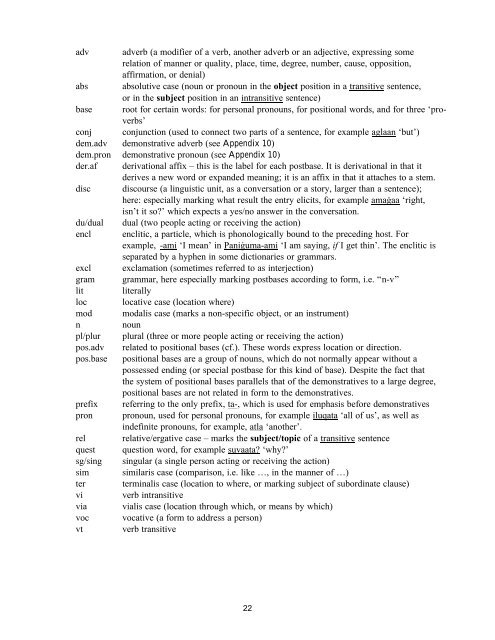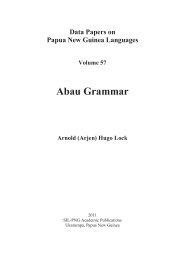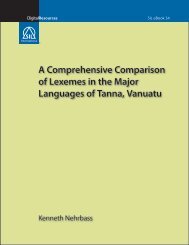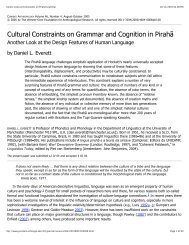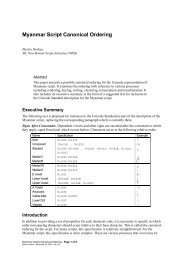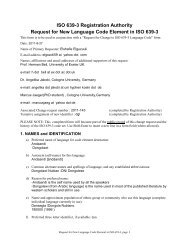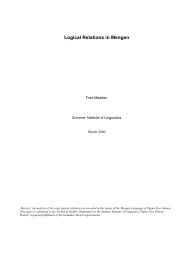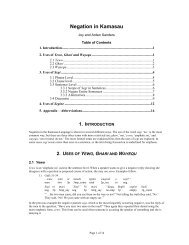- Page 1 and 2: DigitalResources ® Language and Cu
- Page 3 and 4: Language and Culture Documentation
- Page 6: FOREWORD It is with great pleasure
- Page 9 and 10: experience with the meaning to whic
- Page 12 and 13: GENERAL INTRODUCTION There are seve
- Page 14 and 15: Fricatives Fricatives are the conso
- Page 16 and 17: ua/ ukuak ‘these [dual] here’ /
- Page 18 and 19: Quviasrugusri takku piqaqtusri nià
- Page 20 and 21: the goal, and the hitting is the ac
- Page 24: IÑUPIATUN-ENGLISH 23
- Page 27 and 28: aanàuaq aasruak aanàuaq n. 1) amu
- Page 29 and 30: agaayyun aglaktitchiri go to church
- Page 31 and 32: aàiñaq- aippaagu aàiñaq- vi. to
- Page 33 and 34: akiaqtaaq- akiääaq- akiaqtaaq- vi
- Page 35 and 36: akkiqsimaaq- aksi- steady something
- Page 37 and 38: alai! aliuàutigi- alai! excl. 1) e
- Page 39 and 40: amaääa (C) amiq amaniaäani locat
- Page 41 and 42: anaqaksraaàiaq aniqsaaq- anaqaksra
- Page 43 and 44: anuqsruit- aäayukâiq anuqsruit- v
- Page 45 and 46: aäivraun aäuniaqti qauq-. aäivra
- Page 47 and 48: apitchiq- aqagutaaq- (C) apiqsruutr
- Page 49 and 50: aqqaa aquvsallak- someone's presenc
- Page 51 and 52: arriqsit- asriavik shows. Syn: anaq
- Page 53 and 54: atausiiñaq atipiaq atausiiñaq vi.
- Page 55 and 56: atliuraq attaqsraq- bottom. Variant
- Page 57 and 58: atuyusraq- aullaàniiri atuyusraq-
- Page 59 and 60: autaaq- avatiksrat autaaq- vt. to a
- Page 61 and 62: avva ayuànaq- avuunaaq- vi. to be
- Page 63 and 64: igalaaq- (C) igliàaq- horizontally
- Page 65 and 66: igniqsuutit (C) iàñisuliq- igniqs
- Page 67 and 68: ikayuq- ikkiq windpipe. See: tuqâu
- Page 69 and 70: ikpaatchiaq ikuäa (terminalis). ik
- Page 71 and 72: illiuq- iáaksraq- illiuq- vt. to p
- Page 73 and 74:
iáasruk- iáiraqsiuq- iáasruk- vi
- Page 75 and 76:
iáitqusriqâuk iáuqutaq iñuusriq
- Page 77 and 78:
imaàun imaupkaq- imaàun n. tannin
- Page 79 and 80:
imiäñiq imña Variant: imiäasi-;
- Page 81 and 82:
inattuaq innuli- baby at ease, to o
- Page 83 and 84:
iñisaq iñugat rack. iñisaq n. 1)
- Page 85 and 86:
iñuniaàvik iäiáàaaqnisaq iñun
- Page 87 and 88:
ipiqtusruk- ipuktaaàun ipiqtusruk-
- Page 89 and 90:
iqiràalik iqsuäa- iqiràalik n. s
- Page 91 and 92:
irrit- (C) isavgaq itrisriun. irrit
- Page 93 and 94:
isuit- (C) isrukâitchaaq isuit- (C
- Page 95 and 96:
itchuaäavik itkuak (C) itchuaäavi
- Page 97 and 98:
itri ivrauttuq- Variant: irrait-. i
- Page 99 and 100:
kaimàuaq- (C) kakitáaànaq kaivá
- Page 101 and 102:
kamanau- kaniq- kamanaàniqsraq gre
- Page 103 and 104:
kaäiqãuk katchak- kaäiqãuk n. 1
- Page 105 and 106:
kavisiáik kigga kavisiáik n. fish
- Page 107 and 108:
kiisaimma killigiksi- canadensis. k
- Page 109 and 110:
kiluvasik- kiñiq kiluvasik- vi. to
- Page 111 and 112:
kiämiàun kipkua a drill. kiämià
- Page 113 and 114:
kivaliàiq kumaàuq kivaliàiq n. e
- Page 115 and 116:
kuukukiaq maani kuukukiaq n. common
- Page 117 and 118:
malài- manigaaàaq malàik set of
- Page 119 and 120:
maäuk- mau- maäuk- vt. 1) to thru
- Page 121 and 122:
milaasiq miqu- milaasiq n. molasses
- Page 123 and 124:
mitqun naalaànitqaiàik- qipuktuq-
- Page 125 and 126:
nagruk- nakkaaàaqti See: nuààit
- Page 127 and 128:
naligi- nalunaqsi- naliàak-. nalig
- Page 129 and 130:
napa- nasaiäaruaàruk napa- vi. to
- Page 131 and 132:
nauyaaq niglanaaq- nauyaaq n. 1) yo
- Page 133 and 134:
niiãaqtaq nipi- bone. niiãaqtaq n
- Page 135 and 136:
niuqtuun nuààayuat niuqtuun n. dr
- Page 137 and 138:
nuliiq- nunuuraq- nuliiq- vt. to de
- Page 139 and 140:
nuvimmi- paakäa nuvimmi- vi. 1) to
- Page 141 and 142:
paggitri pakkua paggitri n. babysit
- Page 143 and 144:
paâu- paniiä Variant: palluq-. pa
- Page 145 and 146:
papkuak patchisaiyaq- there (modali
- Page 147 and 148:
pauäniq pichakäa pauäaq- vi. to
- Page 149 and 150:
piipkai- piksrun piipkai- vi. to be
- Page 151 and 152:
piñaääa (C) piäuksrak piñania
- Page 153 and 154:
pisiksi pitkua (C) pisiksi n. bow (
- Page 155 and 156:
piyaaptaäa- puâiäa- piyaaptaäa-
- Page 157 and 158:
putyugiaq puvviaqtuuq hole by pierc
- Page 159 and 160:
qaaääa (C) qaàruqaàvik qaaääa
- Page 161 and 162:
qakiq- qakugupayaaq qakipkuänaäni
- Page 163 and 164:
qaluiq- qamna amaqtuq. Variant: aqa
- Page 165 and 166:
qanusriuâiq qapkua qanusriuâiq n.
- Page 167 and 168:
qasigiaq qatraq- water). Variant: q
- Page 169 and 170:
qaunaksri- qavsuk- qaunaksri- vt. t
- Page 171 and 172:
qiiqsruq- qiáa qiiqsruq- vi. to ha
- Page 173 and 174:
qimugviutaq qiñiquuraaq- qamuutaq.
- Page 175 and 176:
qipraq qisiiq- mad about someone. S
- Page 177 and 178:
qiviqit- quiññak- Syn: niviq-; qa
- Page 179 and 180:
qulliurauruaq qupitchuäaq qulliura
- Page 181 and 182:
quunniàñaq quyyavik to maintain a
- Page 183 and 184:
sagluuraq- sakiàmiat men brought u
- Page 185 and 186:
sakmuäa salummaq- sakmaniaäaniñ
- Page 187 and 188:
saniàaqâiq sannaq side by side (o
- Page 189 and 190:
sapiànait- saquiqataq- impossible
- Page 191 and 192:
savaniqâuk- sayyaaàiksi- savaniq
- Page 193 and 194:
siiàáit- sikkuk something too sou
- Page 195 and 196:
siáaqâuk simmiáiuti- siáaqâuk
- Page 197 and 198:
sipi- siqpik something. Syn: iáala
- Page 199 and 200:
sisula- sivu sisuqhaaq- (C). sisula
- Page 201 and 202:
sivut- suàuk- sivuàaäiuti- vt. t
- Page 203 and 204:
Sullivik supputisaq- body." Sullivi
- Page 205 and 206:
suutaunàit- taaääaqtauq suutaun
- Page 207 and 208:
taàium siñaa taktuksiun taàium s
- Page 209 and 210:
tamaakäaquyuuraq tappiq- regular d
- Page 211 and 212:
taruuna tattuqqun taruuna dem.adv.
- Page 213 and 214:
tigguvik tikiutaq aäallaqâuuti-;
- Page 215 and 216:
tiämisuutiqpak titqiaàaq- tiämis
- Page 217 and 218:
tulauti- tunäauraaq- tulauti- vt.
- Page 219 and 220:
tupinäasi- turvigi- siqqutit. tupi
- Page 221 and 222:
tutqaasraaq- tuuqtiq- attitude). Sy
- Page 223 and 224:
uaniakâiq uiáaaksraq located towa
- Page 225 and 226:
ukkuak uliaq- ukkunakäa from those
- Page 227 and 228:
umaa uniaq- umaa excl. hey you! Var
- Page 229 and 230:
uäasik- upit- leather or bleached
- Page 231 and 232:
uqapsaaq- uqsrak- mediator. Syn: ak
- Page 233 and 234:
uqutmugaaq- utitchiaq insulation to
- Page 235 and 236:
uumaruaq- uutiq- uumaruaq- vi. 1) t
- Page 237 and 238:
uvli- uyuniq- uvli- vi. 1) to spend
- Page 239 and 240:
238
- Page 241 and 242:
240
- Page 243 and 244:
2) it modifies the meaning of a nou
- Page 245 and 246:
-asruk- -giik- Do you think yoursel
- Page 247 and 248:
-iik- -kkaq- big lake. Putu qusrimm
- Page 249 and 250:
-làiñaq- -liq- managed to come in
- Page 251 and 252:
-luq- -âiq augment, to ~ ; multipl
- Page 253 and 254:
-naaq- -niaq- Nuurviämuäniqsuq. P
- Page 255 and 256:
-näu- -pak- This is my favorite cu
- Page 257 and 258:
-qaàvik- -qpak -qaàvik- opportuni
- Page 259 and 260:
-ruk -sugruk siktiâuaàaa. (K) Put
- Page 261 and 262:
-sriñaq -taq the light. Aatchuiyum
- Page 263 and 264:
-tit- -tuaq- makinäuraqtitkai. Put
- Page 265 and 266:
-ula- -uti -ula- der.af. make sound
- Page 267 and 268:
-valuk- -yyiaq- See: -paliq-. [Gram
- Page 269 and 270:
characterized by fetch, to ~ charac
- Page 271 and 272:
install on ... new, to be ~ install
- Page 273 and 274:
quality marker: '-ness' supply, to
- Page 275 and 276:
274
- Page 277 and 278:
276
- Page 279 and 280:
across there, located ~ afflicted,
- Page 281 and 282:
amazed, to be ~ antiseptic (iodine,
- Page 283 and 284:
argue, to ~ assault, to ~ argue, to
- Page 285 and 286:
awake sick, to ~ bad habits, to hav
- Page 287 and 288:
attle behind battle n. aäuyaâiq.
- Page 289 and 290:
etrayer blackness vt. manigaq-. bet
- Page 291 and 292:
louse, woman's ~ bone, already gnaw
- Page 293 and 294:
ounce, to cause to ~ away break, to
- Page 295 and 296:
oken, to have a ~ part burrow broke
- Page 297 and 298:
campfire, food cooked on ~ carry, t
- Page 299 and 300:
censure, to ~ chickadee, brown-capp
- Page 301 and 302:
circumcision (Bible) closest, perso
- Page 303 and 304:
comfort, to ~ confidence comfort, t
- Page 305 and 306:
contract, to ~ a disease cotton, fi
- Page 307 and 308:
crave, to ~ cruel, to be ~ crave, t
- Page 309 and 310:
cut, to ~ with an instrument dawdle
- Page 311 and 312:
dehydrate, to ~ desk dehydrate, to
- Page 313 and 314:
dim, to become ~ (of lights) discou
- Page 315 and 316:
ditch, to dig a ~ dough ditch, to d
- Page 317 and 318:
drift, to ~ in a boat duck, common
- Page 319 and 320:
echo, to ~ (walking on hard snow) e
- Page 321 and 322:
entertain, to ~ visitors examine, t
- Page 323 and 324:
expression used at flinch fall, to
- Page 325 and 326:
fear, to ~ fight, to start a ~ fear
- Page 327 and 328:
fish slime flinch, to ~ fish slime
- Page 329 and 330:
follow, to ~ suggestions forward, t
- Page 331 and 332:
frighten, to ~ by pretending to be
- Page 333 and 334:
gather, to ~ people (for support) g
- Page 335 and 336:
gray, to be ~ grow, to ~ hair gray,
- Page 337 and 338:
haircutting tool hardship haircutti
- Page 339 and 340:
heaven, from ~ (not visible) hindqu
- Page 341 and 342:
home, to go ~ house, new ~ home, to
- Page 343 and 344:
hurt, to ~ one's shinbone ignorant,
- Page 345 and 346:
incapable, to seem ~ initiation inc
- Page 347 and 348:
intestines jealous, to be ~ intesti
- Page 349 and 350:
justification knives, maker of ~ ju
- Page 351 and 352:
lap, to sit on someone's ~ lean, to
- Page 353 and 354:
lie, to ~ down on one's side lit, t
- Page 355 and 356:
loon, pacific arctic ~ lullaby loon
- Page 357 and 358:
marrow membrane, scraped from dried
- Page 359 and 360:
miss, to ~ a target morning star vt
- Page 361 and 362:
muffin pan nape n. iraurigauraqtat
- Page 363 and 364:
news, to receive ~ nut news, to rec
- Page 365 and 366:
offering to open, to be ~ n. iáiri
- Page 367 and 368:
outcast oversleep, to ~ outcast n.
- Page 369 and 370:
palate of mouth pass, to ~ in front
- Page 371 and 372:
people related by children's marria
- Page 373 and 374:
play, to ~ ball tag portage, to ~ p
- Page 375 and 376:
prepared item promise vt. upaluäai
- Page 377 and 378:
pull, to ~ string through queen (in
- Page 379 and 380:
are, to be ~ red, to be bright ~ ra
- Page 381 and 382:
emote (place or time) resound, to ~
- Page 383 and 384:
ifle, automatic ~ with .22 caliber
- Page 385 and 386:
udder sailboat rudder n. aquun. rud
- Page 387 and 388:
scare, to ~ into silence seal skin,
- Page 389 and 390:
separate, to ~ sharpen, to ~ separa
- Page 391 and 392:
short item side sheltered from wind
- Page 393 and 394:
sit, to ~ down slap, to ~ sit, to ~
- Page 395 and 396:
slobber, to ~ smooth, to be ~ slobb
- Page 397 and 398:
sock, fur ~ sort, to ~ n. atullaaq
- Page 399 and 400:
spear without barbs split, to ~ wit
- Page 401 and 402:
stair step step, to ~ on stair step
- Page 403 and 404:
stop, to ~ along one's journey stre
- Page 405 and 406:
substitute, to ~ surface, to ~ n. u
- Page 407 and 408:
swipe, to ~ tank vi. aäilàisaaq-
- Page 409 and 410:
tempted, to be ~ That's how it was
- Page 411 and 412:
those out there in the entryway thr
- Page 413 and 414:
toilet paper towel toilet paper n.
- Page 415 and 416:
travel, to ~ to a river's source Tu
- Page 417 and 418:
udder undone, to come ~ udder n. ma
- Page 419 and 420:
unwise, to be ~ uvula unwise, to be
- Page 421 and 422:
visit, to ~ a friend (opposite sex)
- Page 423 and 424:
watch, to ~ out weight, to add ~ wa
- Page 425 and 426:
whip, to ~ will, to ~ whip, to ~ vt
- Page 427 and 428:
withdraw, to ~ worn, to become ~ ou
- Page 429 and 430:
yawn, to ~ zipper yawn, to ~ vi. aa
- Page 431 and 432:
430
- Page 433 and 434:
Aullalgiññiqsuq tallimanun sassaq
- Page 435 and 436:
Appendix 2 Verb Moods and Inflectio
- Page 437 and 438:
IMPERATIVE-AFFIRMATIVE (command) Fi
- Page 439 and 440:
For example, Base ending in Realize
- Page 441 and 442:
IMPERATIVE (Subject - Object suffix
- Page 443 and 444:
CONDITIONAL (realized action - diff
- Page 445 and 446:
Appendix 3 Comparison of noun class
- Page 447 and 448:
Noun Possession Absolutive Relative
- Page 449 and 450:
Appendix 5 Suffixes indicating NOUN
- Page 451 and 452:
Number Possession (Sg. Obj.) Absolu
- Page 453 and 454:
Number Possession (Sg. Obj.) Absolu
- Page 455 and 456:
Class 4c Class 4c - fricative[C]Vq
- Page 457 and 458:
Number Possession (Sg. Obj.) Absolu
- Page 459 and 460:
Appendix 8 Independent Pronouns The
- Page 461 and 462:
Appendix 9 POSITIONAL BASE WORDS Po
- Page 463 and 464:
1. Derivations for Demonstrative Ad
- Page 465 and 466:
Demonstrative Adverb ugga near the
- Page 467 and 468:
Demonstrative Adverb akma across th
- Page 469 and 470:
Demonstrative Adverb piñña back t
- Page 471 and 472:
Demonstrative Adverb qavva in there
- Page 473 and 474:
Demonstrative Adverb qakma out ther
- Page 475 and 476:
Demonstrative Adverb pitcha/pikka u
- Page 477 and 478:
2. Derivations for Demonstrative Pr
- Page 479 and 480:
uäna/ugna one(s) near the door Sin
- Page 481 and 482:
akimna one(s) across there Singular
- Page 483 and 484:
pamna one(s) toward back there Sing
- Page 485 and 486:
qaäna/qagna one(s) out there Singu
- Page 487 and 488:
samna one(s) out there Singular Dua
- Page 489 and 490:
3. Demonstrative Pronouns with pref
- Page 491 and 492:
Isillaktuq iñuuna. He entered righ
- Page 493 and 494:
Sakimna katchaktuqtuaq isitlaiàukn
- Page 495:
REFERENCES Jacobson, Steven A. 1984


